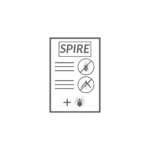
Same Day* Service! Free Inspections Rodent Control
Spire Pest Control’s Rodent Control
Exterminator Service
Even hearing the word “rodent” is enough to make some folks shudder. Although rodent control isn’t always top-of-mind, picturing a dirty little creature with two long front teeth scurrying around your house probably makes you want to call a rodent exterminator. That’s where we come in –Spire Pest Control wants to help you get rid of rodents.
Signs of an Rodent Control
Infestation
You might already know you have a rodent infestation but here are a few of the most common signs rodent exterminators look for in the your area.
droppings
The first sign of a mouse or rat infestation is their droppings. These are usually found in their favorite hiding spots, such as basements, attics, crawl spaces, behind shelves or drawers, or in cabinets or pantries.
noise
Sometimes the second most common sign of rodents in the house are nightly noises when mice or rats scurry from place to place, fight each other, or gnaw on something.
gnaw marks
Because their teeth never stop growing, mice and rats have a strong urge to chew things. They can chew through wood, hard plastic, or even metal to get to food, find shelter, or make nests.
Sightings
Though less common than the other signs, it is possible to surprise mice and rats in the house when turning on the light in the kitchen, attic, or basement. In rare cases, a mouse or rat may run into the open to find water, food, or better shelter.
What You Need to Know About Rodent Control
- A rodent is a mammal with incisors that constantly grow; they don’t have canine teeth. Incisors are the two front and two bottom teeth in the mouth.
- If rodents don’t have material to constantly chew on, their incisors will grow so long that they can’t eat.
- Common Rodents Include:
- Rodents can carry harmful diseases such as:
- Bubonic Plague, Tularemia, and Hantavirus
- You might have rodents in your home if you discover unusual droppings or hear strange scratching sounds. If you suspect rodents, it’s best to call the professional pest control technicians from Spire.
Helpful Rodent Control Prevention Tips
Seal common entry points.
Reduce food and water access by fixing leaks and cleaning before and after meals.
Reduce hiding places by cleaning around kitchen appliances and other potential hiding places.
Clean up the yard: including branches, leaves, and woodpiles
How Do I Get Rid Of Bed Bugs?

Step 1: Schedule
Call (888) 316-3615 for a free bed bug treatment quote and a timely appointment with skilled technicians. No obligation to proceed.

Step 2: Treatment
A certified technician will conduct a thorough bed bug inspection of your home to provide a customized treatment plan.

Step 3: Follow Up
We provide a detailed report of the service and helpful recommendations. For maximum effectiveness, receive a follow-up treatment 14 days after treatment.

Satisfaction Guaranteed!
We guarantee you won’t see bed bugs for 30 days. If you do, we will come back and treat again for free.
Call to Get a Quote or to Schedule Same Day* Service
Rodent Control FAQ
The best control of rodents is prevention. Filling in any holes of the house’s exterior and sealing any food in airtight containers will make your home less attractive and less accessible to them.
But if you already have a problem and need to remove rodents, these measures won’t fix the problem on their own. CallSpire Pest Control today for a free estimate, and make your home safe and comfortable again.
Yard Rodents: Gophers and groundhogs dig massive tunnels and eat plant roots, fruit, and vegetables. Voles tend to stay above ground and eat plants. Mice and rats may also dig burrows through the grass. Moles also dig tunnels while they look for insects, but they aren’t technically rodents.
House Rodents: Mice and rats chew on wiring, gnaw on walls, invade storage containers, rip up papers and fabrics, and contaminate food. Rats and mice can also spread fleas and ticks as well as diseases like hantavirus, leptospirosis, tularemia, and the bubonic plague.
Squirrels are a very common problem in some areas. They can crawl inside attic spaces, chew through wood or wiring, and spread diseases, fleas, and ticks.
A bite from a rodent can be extremely serious, but these are relatively rare. Rodents typically try to stay away from humans and avoid contact with us.
Humans contract diseases spread by rodents when we are bitten, when we come in contact with a rodent’s droppings or urine, or if we handle a rodent, including a recently dead one. If you’re bitten by a rodent, seek medical attention immediately.
Common signs of rodent activity in your house are:
Feces. Rats tend to gather theirs in one particular spot while mice scatter them everywhere.
Sounds at night. Rats sometimes fight over food or dominance and squeal and make rustling noises. You might also hear mice scurrying or chewing on something.
Nests. Mice and rats make nests after they mate. They prepare for juveniles by building nests out of soft materials like paper, fabric, pillow stuffing, bits of cloth, loose carpeting, or wall insulation.
Rodents like rats, mice, and squirrels have a strong sense of smell, which is why cleaning the house and storing both your food and pet food in airtight containers is one of the first steps to rodent prevention.
Professional pest experts can help you discover specific things you can do to keep rodents from invading your home.
Yard Rodents: Gophers, groundhogs, mice, rats, and voles will come to your yard looking for plants, nuts, berries, fruit, and shelter. Moles also like to dig in the yard while looking for insects, but they aren’t technically rodents.
House Rodents: Rats and mice are the most common rodents that will invade homes.
Body size. Adult rats are larger than adult mice. Norwegian rats also have a characteristic hunch in their back.
Ears and Tails. Rats have larger, more pointed ears and shorter tails than mice. A mouse’s tail has fine hairs along it while a rat’s tail is entirely bald.
Droppings. The common Norwegian rats have cylindrical or pill-shaped droppings, and roof rats have a banana shape to theirs. Mouse feces look like little grains of brown or black rice
Dropping placement: Mice scatter their droppings randomly throughout their hiding places. Rats are more aware of their droppings and find a hiding spot to use as a latrine, sort of the way a cat uses a litter box.
Behavior. Mice are extremely curious about everything in their environment and will explore new things readily. Rats are “neophobic,” which means they are frightened of new things and require more time to grow accustomed to something new.
Society. Rats and mice both can live in colonies or family groups, but rats can create very large colonies very quickly. Compared to mice, rats are much more violent with each other when they dispute over territory, dominance, or food.
Intelligence. Unlike mice, rats can observe and mimic each other’s behavior to navigate the world around them and avoid anything that seems dangerous.
Count on Spire Pest Control for Comfort and Safety
To ensure our customer's safety, we insist on a thorough screening process for all Spire Pest Control Technicians. They also complete extensive training in the classroom and on the job with an experienced mentor before servicing alone.
See photos of our team by visiting the Meet Our Team page for your branch.

Money Back Guarantee
If a Spire Pest Control customer has an infestation of covered pests in their home or business between regularly scheduled Home Protection Plan treatments, we will come back and perform targeted treatments to get rid of the pest at no charge. If Spire Pest Control cannot resolve the problem after three such targeted treatments, we will cheerfully refund the customer’s last monthly subscription fee, as long as all other terms of the agreement have been met.
And if you see any pest activity between your regularly scheduled treatments, simply give our office a call; we'll come back at no additional charge.


